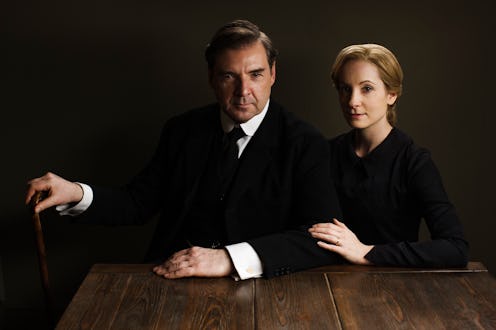
If you watched the Feb. 15 episode of Downton Abbey and were happy that Anna and Bates were back to honestly communicating, then Sunday's penultimate Season 5 episode (there is the Christmas special to consider) probably hurt a whole lot. The murder investigation of Mr. Green leads to Anna being arrested and sent to prison on Downton . And now all I can think about is how awful 1920s women's prison will be for Anna.
Everything had just kind of started to get better for Anna. She discovered that her husband was actually not guilty of murdering the man who raped her (like I said — things are "kind of" better). She and Bates finally returned to being that loving couple we have adored over the seasons of Downton when they started to think of their future. But now she's going to be sent to jail for allegedly murdering her rapist. Has anything more unfair ever happened on this show?
I mean, there is a baby bit of a chance that Anna did kill Mr. Green — but I can't in good conscience believe that. And whenever things start working out, Downton has a way of ripping that joy away from us. (Remember Matthew?) So with Anna headed to prison (even if only for a short time), I have a sneaky suspicion that my knowledge of Orange Is the New Black isn't painting an accurate picture of Anna's (hopefully temporary) new life.
Luckily (I guess?), Anna has a husband well-versed in the British prison system, but by the 1920s, prisons were separated by gender. In a review of the book The Oxford History of the Prison: the Practice of Punishment in Western Society, reviewer Dr. Nikolaus Wachsmann discusses the book covering prison reform in the U.K. in the 1800s. Wachsmann wrote that the "19th century reform movement was definitely welcomed by the small number of female prisoners. Women were finally separated from male prisoners, which put an end to their constant exploitation. For example, the governors of the London Bridewell had in previous centuries run their prison as a lucrative brothel, forcing female inmates into providing sexual services..."
Since Anna would be in prison in the 1920s, she would have (thankfully) already benefitted from that part of the reform. One female prison that was active in England during that time was Holloway (it is still open and the largest women's prison in Europe). Opened in London in 1852, it became an all-female prison around 1902. Interestingly, Holloway saw a lot of inmates who had been arrested in their protests to get women the right to vote. (Women over 30 got the right to vote in 1918 in the U.K., but it wasn't until 1928 that women from 21 up could vote too.) So, there's a chance that Anna would be alongside suffragists in prison. (Sybil would have been proud ... you know, except for the prison thing.)
Women were also sentenced to death in Holloway. One woman, Edith Thompson, was hung at Holloway in 1923 for the murder of her husband. (It is still discussed whether Thompson had anything to do with the murder.) Thompson's story is a scary reality of what Anna could be walking into in prison.
Although I believe that Anna is innocent — and thus will not stay in prison long — the fact that she goes to prison at all is frightening. But she'll have two very understanding people at Downton to confide in about what happens to her in jail — her husband Bates and fellow maid Baxter.
Images: Nick Briggs/Carnival Films 2014 for MASTERPIECE; my-attack-romance, ninakrylova (2)/Tumblr